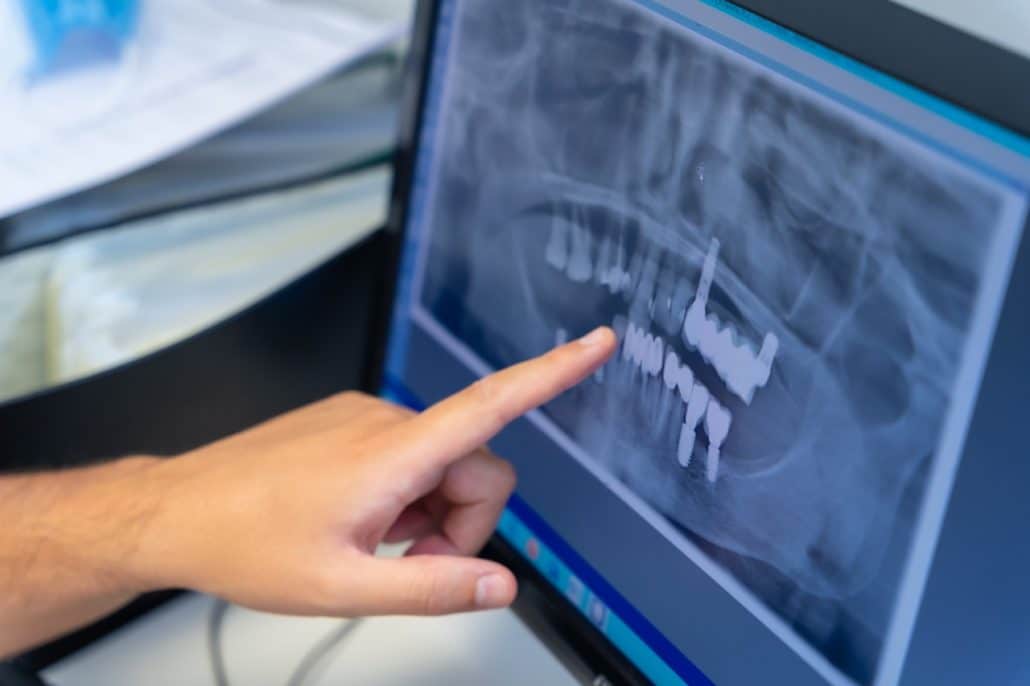Dental Medicine Doctor
Request information
"*" indicates required fields
Request Information
Request information
"*" indicates required fields
Program Description
This is a 4-year program with a comprehensive competency-based curriculum. Students will be immersed in a biomedical, behavioral, and preclinical sciences didactic education curriculum during the first year. The second year will provide preclinical dentistry experiences supported by simulation facilities. In addition, years three and four of the DMD program will provide additional clinical instruction, assessments, and the opportunity to develop and demonstrate competencies necessary to perform as a general dentist.
The School of Dental Medicine (SDM) offers the Predoctoral Dental (DMD) Education Program conducive to a Doctorate in Dental Medicine.


Mission
The Mission of the PHSU-SDM will be to prepare culturally competent, excellence driven, ethical dental practitioners with the empathy and academic preparation to provide dental care to underserved populations.
To accomplish this, the School is committed to a curriculum design of four interrelated activities: teaching, research, patient care, and service. Development and discovery, dissemination, and use of knowledge toward enhancing oral health and overall health is a major component of our mission.

Vision
Shaping oral health education to improve people’s lives, both at an individual and community level in collaboration with other health professionals.
The Dental Medicine Doctor (DMD) program goals are:
- Provide dental students with a high-quality educational curriculum that integrates evidence-based knowledge in biomedical and behavioral sciences, as well clinical skills necessary to become competent and ethical professionals.
- Deliver patient-centered comprehensive oral care to underserved population within our community.
- Enhance recognition of the institution’s commitment to excellence in basic and clinical research, scholarship, and creative pursuits, supporting existing investigators and recruiting new highly qualified researchers.
- Promote and support continued education to faculty and staff to achieve excellence in education and service.

FAQ
What is the CLEP exam equivalent to, and how many credits can it validate?
The CLEP exam is equivalent to the College Board Advanced Placement. It is a standardized test administered by the College Board that allows students to demonstrate proficiency in various subjects. Successful completion of the CLEP exam can validate up to 6 college Spanish or English credits at PHSU. However, to fulfill the minimum requirement of 12 credits in Spanish and English, only 6 credits from the CLEP exam will be accepted, while the remaining 6 credits must be earned from courses taken at an accredited university.
What transcripts do candidates need to present, and what does the GPA calculation include?
Candidates must present transcripts from all academic institutions they have attended, including community colleges, universities, and any other post-secondary educational institutions. The GPA calculation must include all coursework completed at the undergraduate level.
What documentation is required for Spanish course credits obtained at a second university?
Candidates who have taken Spanish courses at a second university must obtain an official transcript that includes their grades for those courses. This transcript is necessary for evaluating and transferring the credits earned in Spanish coursework.
What are the admission requirements for dentists who graduated abroad from non-CODA-accredited schools?
Dentists who graduated abroad from schools not accredited by the Commission on Dental Accreditation (CODA) can apply for admission to the PHSU dental program starting in August 2024. However, as PHSU does not have an advanced placement program, they must complete the four years of the program for their accredited Doctor of Dental Medicine (DMD) degree, which is valid for practice in Puerto Rico and the United States. The admission requirements for these candidates are the same as those for regular students, and their program of study will be the same as that for other students. PHSU is considering establishing an advanced placement program in the future, but such programs would require CODA approval, and there is no set date for their implementation at this time.
Can students apply to the university with courses in progress, and what happens after acceptance?
Candidates who are completing requirements after the admission offer, must submit the official transcript with the approval of required courses before May 31 of the year. If the student does not approve or provide evidence, the admission offer is revoked.
What admission requirements must international students meet?
International students must meet all standard admission requirements applicable to resident students.
What is the current policy regarding transfer students?
The university currently does not have a policy regarding the admission of transfer students.
Which DAT exam must Canadian students take?
Canadian students must take the USA Dental Admission Test (DAT) as part of their application for admission to the university. The Canadian DAT is not accepted for admission purposes.
Degree information
A Doctor in Dental Medicine degree is required to practice Dentistry in most parts of the United States and Canada, including Puerto Rico and other parts of the World. Candidates are encouraged to search for specific requirements in the country where they plan to practice as dentists.
The Doctor in Dental Medicine (DMD) is equivalent to the Doctor in Dental Surgery that other institutions grant (DDS).
Requirements
| Biology | 8 |
| Chemistry | 8 |
| Organic Chemistry | 8 |
| Physics | 8 |
| Behavioral and Social Sciences* | 6 |
| Mathematics | 6 |
| Spanish | 12 |
| English | 12 |
- Bilingual in English and Spanish (read, write, speak, and understand).
- Minimum GPA of 2.7 (on a four-point scale) is required for applying.
- Minimum SGPA of 2.7 (on a four-point scale) is required for application.
- Minimum DAT score of 15 (average of “Academic Average” and “Perceptual Ability”). The scores must be no more than three years old.
- Minumum of 3 letters of recommendation and a maximum of five (one letter will be from volunteering at a community activity).
- 24 hours of shadowing at a dental office.
- Community service and extracurricular activities
- Academic performance (20%)
- DAT scores (20%)
- Essay (10%)
- Extracurricular activities (10%)
- Experience in the health field (research, community service, shadowing, and others; 10%)
- Minimum of three (3) letters, maximum of five (5). One letter must be from volunteering at a community activity. ADSAS platform only accepts 4 letters. If the candidate chooses to send an additional one, should send it to admissions@psm.edu
- Interview (20%)
External Resources
POur strong position as a health sciences campus provided the framework to be supported by faculty and resources with experience in health/sciences education. Dental students will share the campus with students from the Schools of Medicine, Behavior and Brain Sciences, Public Health, and Nursing.
The dental profession brings great opportunities for personal and professional growth. To become more familiar with Dentistry as a profession, we invite you to visit the webpage of the American Dental Education Association, in particular, the following link: https://adea.org/GoDental/
Other IMPORTANT LINKS
- American Dental Education Association: adea.orgg
- Apply to dental schools: https://adea.org/GoDental/Apply
- To obtain a Dental Personal Identification Number and apply for the DAT examination.
Learning Outcomes
- Evaluate and integrate biomedical, epidemiological, and research outcomes using critical thinking for evidence-based clinical practice.
- Recognition of ethical principles and legal issues and applying them accordingly in decision- making while providing dental care.
- Demonstrate effective management of a general dental practice, including technology resources, interpersonal skills, and communicate effectively with individuals from a diverse population.
- Develop and participate in prevention and educational health promotion strategies based on the fundamental principles of behavioral sciences and risk assessments for individuals of all ages, including oral cancer screenings.
- Manage oral health care, including assessment, diagnosis, prognosis, and treatment planning with informed consent for patients of all ages and those with special needs.
- Prevent, identify and manage dental emergencies.
- Manage pain and anxiety in patients of all ages.
- Diagnose and assess temporomandibular disorders.
- Diagnose and manage periodontal diseases.
- Perform and complete restorative procedures that preserve tooth structure, replace missing or defective tooth structure, maintain function, aesthetic, and promote soft and hard tissue health.
- Diagnose and treat malocclusion and space management.
- Manage teeth replacement for partially and completely edentulous patients with a fixed prosthesis, removable prosthesis, and dental implants.
- Diagnose and manage pulpal diseases.
- Diagnose and manage surgical treatment needs.
- Diagnose and manage oral mucosa and osseous diseases.
- Demonstrate self-assessment and professional lifelong learning skills.
Accreditation
The program in dental education received initial accreditation from the Commission on Dental Accreditation. The Commission is a specialized accrediting body recognized by the United States Department of Education. The Commission on Dental Accreditation can be contacted at:
(312) 440-4653
or
211 East Chicago Avenue, Chicago, IL 60611
The Commission’s web address is https://coda.ada.org/
